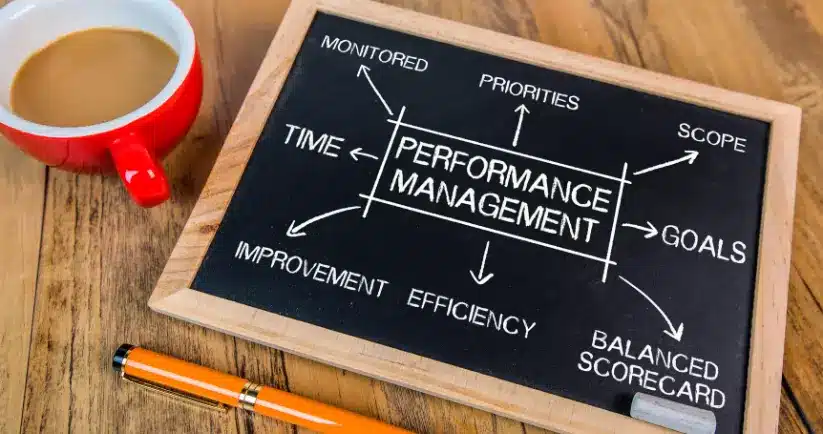What is Performance management?
Performance management is a way to utilize a workforce at optimum efficiency. Many people think that it is a once-a-year occasion but this is not limited to annual appraisal. It is a continuous process. It is a strategic plan to raise the quality of the output by an individual to the maximum.
When done right, it aligns organizational goals with an employee’s productivity successfully and people get continuous feedback from their seniors. A performance management system measures and corrects the course of action.
Good Performance management helps to ensure that the efforts are contributing directly to fulfilling corporate goals. The focus can be on employees, teams, departments, or organizations as a whole. The standards and targets of performance management are generally decided by senior management.
The overall performance is constantly monitored. There can be continuous feedback, correction, rewards, and training for the workforce. It efficiently implements strategic plans and reduces costs. It is also easier to implement changes by including them in the performance management system.
It is supposed to identify, develop and measure employee performance continuously toward the target. The workforce needs to stay motivated to stay on course and constantly elevate their output. For this, it is important to have the right performance management software.
When there is a lack is a proper system and most of it is done manually, employees find themselves confused and managers get frustrated. Which can hamper the overall program. In this blog, we will discuss some principles of performance management for desired results.
The Principles of Effective Performance Management
There are certain principles of performance management that are beneficial for enhancing the effectiveness in managing performances of targeted objectives and shifting the focus on productive outputs.
Performance management is an ongoing process that requires certain theories to be framed upon for which it has a few vital principles such as :
➔ Transparency
The first and foremost principle of performance management is to make employees feel secure and feel included by maintaining transparency. It brings in a certain level of clarity and makes them feel at ease. This does not mean that every decision and every formal communication should be accessible to everyone.
Ambiguity in any program causes confusion and mistrust. The workers are more likely to feel controlled and pressurized when they are left alone with very little information.
Transparency makes it easy to understand how individual and team goals align with the firm’s goals. Employees should be able to see themselves as important contributors in the larger scheme of things. They are likely to be motivated and enhance and adjust their performance and efforts towards common goals.
➔ Set the Right Goals
It is important to define the goals. Set the right goals that are aligned with the values and objectives of the company. It makes them meaningful. Performance management should be goal specific so as to maintain objectivity and avoid perplexities in accomplishments.
Every constituent entity in the firm must understand what is expected. Make these goals an opportunity to raise the performance bar which is attainable. When the targets seem impossible to reach as compared to the present situation that itself acts as demotivation. The goal should not be too easy to achieve either. It is important to find the right way that motivates and is easy to measure. so, the performance can be managed to raise the bar at its optimum.
➔ Be Specific
Managers and employers should align the goals and objectives of the company align with individual targets. The same should be communicated to every team member. This helps to direct all the efforts towards a common target.
Any uncertainty while sharing expectations and objectives should be eliminated. Keep it crisp and simple to understand. This will make employees direct their efforts towards enhancing their performance according to the set criteria and increases productivity.
When managers fail to deliver specific information, people tend to put some vague efforts to please their superiors. Most of the time these efforts are not synced with what is expected which is a waste of time and work. This also cuts employees from the possible growth that a well-defined performance management strategy can bring.
➔ Measure
For a successful performance management program, the criteria must be measurable. Define simple and definable goals. The employee should understand their progress and alignment towards the program. When there is clarity and simplicity in the measures the processes flow smoothly.
The corrective actions and solutions are easier to implement. When there is a standard set to define the performance it avoids resentment through misjudgment or confusion and enhances development and growth in Organization.
➔ Communication
For any program where people are involved, communication is the key to success. Performance management is to manage people to achieve central and individual goals. The right communication system can increase efficiency and speed up the entire process and which results in elevating the good performance of an employee.
When messages are communicated positively, they happen to be impactful. People feel they are valued when necessary information is shared with them.
Every entity in the firm should always have enough information to keep their performance to the optimum. It makes things run seamlessly and does not disrupt collective performance. In the time of a crisis too, you can rely on communication as it is a very important tool to keep the employee performance intact.
➔ Give Feedback
The employee must receive feedback for the success of any performance management program. They should know where they are as compared to the expectations. When specific feedback is given at the right time, the receiver can take corrective measures and redirect their performance.
There can be multiple sources for it. That should be conveyed systematically and regularly. When employees get factual feedback based on facts, it empowers them. They get the opportunity to improve their performance to achieve goals. This makes performance management easier as there is constant reinforcement which needs to be managed at every level so the individuals, teams, and departments collectively contribute towards the achievement of goals on the basis of feedback received.
➔ Right Tools
Employees are expected to yield productive output which will be beneficial for their personal growth as well as organizational wellbeing but the result can’t be expected when there are no tools to help achieve it. To do any task successfully the right tools and technology are important. The workforce should be equipped with the tools that make their tasks faster and the process to do so becomes smooth.
The technology should support as well as increase performance and should streamline time-consuming tasks. Proper training for employees on technology is also important to enable them to do what is expected from them and also solve daily challenges.
➔ Motivation
Motivation can be easily overlooked or completely ignored by corporates. It doesn’t seem to have any measurable impact. But it is crucial to keep people motivated. That helps them to stay focused on their targets. Performance management is a continuous process and inspiration has to be constant too. All people need some type of motivation.
But the same tool of motivation does not have a similar impact on everyone. Take time and survey to understand what motivates the individual. Motivated people perform better than those who do not receive constant encouragement. Design some strategies to keep them encouraged regularly. So they are motivated to achieve targets and aim for higher performance.
➔ Praise
Last but not least, the Principle of performance management includes praising employees. Praise is an underestimated tool in performance management that has a significant impact. The efforts invested in achieving organizational goals should never go unappreciated.
Those who work hard to increase their output for organizational and personal targets will feel motivated to work harder. Praise also indirectly affects others and inspires them to put effort too. There can be prefixed rewards according to criteria.
Some well-thought awards for the star performers of the week and month also have a significant impact. It does not always have to be a year-end activity. Praise can be simple words or rewarding.
The performer gets it instantly as soon as they reach the target without any delay, as well as can be given during scheduled feedback. Not getting any kind of appreciation can cause them to drop their performance on their next target. So make sure that everyone feels seen and valued for the hard work they put in.
Also Read: 11 Key Objectives of Performance Appraisal in 2023
Summary
Performance management is a continuous process of achieving organizational goals by aligning individual efforts with them. Principles of Performance management should ensure achievable goals and objectives. The criteria for attaining targets, rewards, and awards must be specific and simple so as to avoid complexities.
Give people the necessary information, tools, technology as well as training to make them capable of better productivity and enhance the overall efficiency of the organization.
To learn more about the latest HR trends, read our blogs here.








